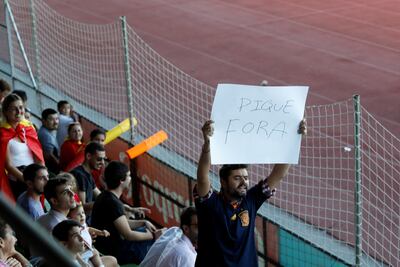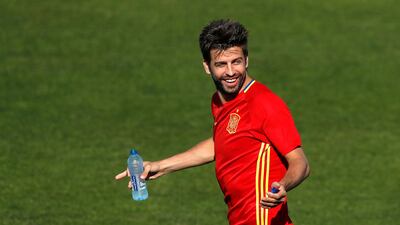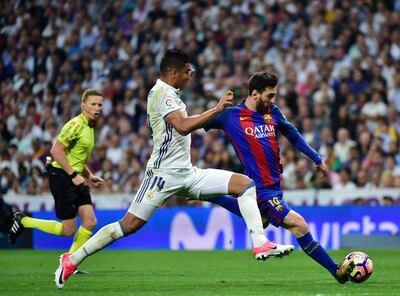“So, Albania will be a tough game, right?” a friendly journalist and friend of Spain’s Gerard Pique asked during a news conference on Wednesday.
The Barcelona defender laughed heartily, for he knew that the main line of questioning would be about anything but Friday’s World Cup qualifier against Albania in Alicante, a game which could see Spain qualify for the World Cup finals if they win.
Pique, 30, will be booed in the Jose Rico Perez, an open stadium whose Soviet-era distinctive floodlights loom over 30,000 blue seats at the back of the sun-blessed port city of 330,000.
Feelings are running high in Spain after Sunday's Catalan referendum which was declared illegal by the Spanish government, a government widely criticised for allowing the use of force to prevent people trying to vote.
It is the biggest Spanish crisis in the years since democracy was installed after the death of General Francisco Franco in 1978 and one which is intertwined with sport.
Catalan leader Carles Puigdemont has said that he will declare the autonomous region independent and Pique is seen as a hardline Catalan by many in Spain.
He is actually a moderate who said that he feels both Spain and Catalonia will be worse off if they separate, a point he reiterated on Wednesday.
That will not have pleased hardline Catalan separatists, but Pique has long been capable of thinking and speaking for himself.
He also has the intelligence and confidence in his own views to front up journalists and engage in conversations with them.
He does not distrust the media and counts several journalists as close friends.
“Politics is a drag,” he said ahead of the game against an Albania side better versed in how politics and sport can intermingle.
“But why shouldn’t I express myself? I understand those players who don’t want to say anything.
"We’re footballers but we’re people, too. Why can a journalist or a mechanic express themselves but not a footballer?”
Pique’s thought about quitting the national team and tearfully he said on Sunday that he would consider leaving if the coach or players felt uncomfortable with him playing.
He was escorted off the training field after being jeered in an open training session on Monday, but asked whether he was going to quit Spain, he said: “I considered it but in the end you have to evaluate every option and after thinking about it for a long time that I decided not to as leaving now would be letting the people who insult me win.”
Pique is right in thinking that a minority boo him, but one man booing makes a lot more noise than 10 sitting in silence.

He has never spoken out in favour of independence, only for Catalans to have the right to decide, but the issue will remain and with it questions about what happens in football should Catalonia become independent.
The Catalan national team, which already plays non-Fifa sanctioned friendly matches in an annual carnival which creates a far better atmosphere than most Barca games, would be fine on the international stage.
Though Xavi, Victor Valdes and Carles Puyol are no longer top level or have retired, Catalonia can call upon the quality of Pique, Sergio Busquets, Jordi Alba, Sergi Roberto, Gerard Deulofeu, Hector Bellerin, Kiko Casilla, Martin Montoya, Marc Bartra, Cesc Fabregas and Sergio Garcia.
The next generation are in the young sides at Barcelona, Espanyol or the Manchester clubs.
Independence would put Barca’s future in the Primera Liga in serious doubt.
Though football allows exceptions, from Welsh clubs including Cardiff City and Swansea City playing in England, or Monaco playing in France’s Ligue 1, efforts from Rangers and Celtic to leave Scotland to join the Premier League have been stifled.
When Yugoslavia splintered into seven new countries, that meant seven new domestic football leagues.
This destroyed the former Yugoslavia league, a competition strong enough to provide European champions Red Star Belgrade in 1991 and 1966 finalists Partizan Belgrade.
The domestic rivalries between huge Belgrade clubs and Croatian giants Hadjuk Split and Dynamo Zagreb were lost to the history books.
Catalonia, with an economy the size of Portugal and a bigger population than Denmark and Norway could stage a domestic league, but it would be far weaker than the Primera Liga.
Only Barca, Girona and Espanyol are in the top flight. Reus and Gimnastic Tarragona are second tier, but you would have to go to Spain’s fourth tier to make the numbers up to 20. Pobla Mafumet, the 20th-ranked Catalan side, play to three-figure crowds.
Opinions vary among Barca fans about what happens next.
“Would the Premier League have us?” asked Jordi Camps, who goes to every Barca home game in the aftermath of Sunday’s referendum. “I’d love going to Old Trafford, Anfield and the Etihad and take all your titles!
“I feel horrible things about the Spanish state. Leaving La Liga would not concern me. The clasico doesn’t matter compared to the dignity of Catalan people.”
The Primera Liga needs Barca and Barca needs the clasico, the biggest game in world football.
______________
Read more
El Clasico matches to be shown through Abu Dhabi Sports 1 and 2
______________
Barca also have to be careful about appealing to the Catalans who make up 90 per cent of their match going fans.
To them, Barca really are more than a club. But Barca must also sate the vast international audience which they actively encourage.
They care little for Spanish or Catalan politics, more for Lionel Messi and Luis Suarez.
Past Barca prospective presidents have campaigned on a ticket of having a more Catalan focus.
The Premier League would not be able to take Barcelona, but a European Super League would and the Premier League has its own issues.
The biggest six clubs, those from Manchester, north London and Chelsea, plus Liverpool, want a bigger share of the overseas media money. Talks have broken down. The unity of the league is strained.
The power lies with the biggest clubs. It is that power which saw the formation of the Premier League and the Uefa Champions League in 1992.
Barcelona v Manchester United is infinitely more attractive to the global market than United v Swansea City or Barca v Leganes.
Yet United and Barca meet in friendly games and have not played each other competitively for six years.
It may seem absurd that they do not play each other more frequently, as absurd as Barca leaving the Primera Liga.
But while politics will continue to shape football, money will ultimately shape it more.
__________________________________________
Read more
Madrid's Ramos criticises Pique for pro-referendum comments
Ian Hawkey: Messi form crucial for 2018 World Cup organisers
John McAuley: Syria's attack can cause Australia problems
__________________________________________



